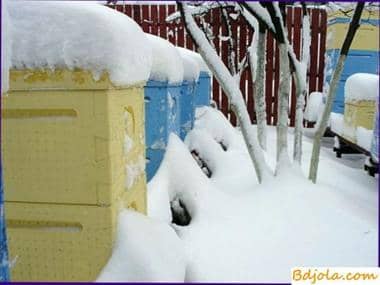
Wintering proceeds normally when the deep, long-lasting peace of the bees is not disturbed. After all, they are in a state of low life in winter, they move very little. They doze, take care of themselves, accumulate strength by spring. Consume and the minimum amount of food – less than a kilo of honey per month. Only by the spring, when the brood appears in the nest, the temperature of the club rises, the bees become more energetic. Then the consumption of honey and perga also increases. In the hollows of bees in winter, no one bothers. Only in rare cases will the marten try to penetrate to them or the woodpecker will continue to hollow – a great hunter to insects.
Any disturbance of rest, even short-term, we call back, sometimes very painful reaction of the family. The metabolism of insects immediately rises, the temperature of the club rises, the bees become mobile and excited, many break away from the club and freeze on cold honeycombs, walls and the floor of the hive. Frequent causes of disturbance of the family’s peace food poor food, death of the uterus, excessive dryness, or, conversely, excessive humidity, high, a temperature that is often kept in a warm, stuffy room, where bees are hibernating, or with excessive warming and a small nest.
Anxiety to bees is caused by careless visits to winterers, a bright light, a knock on the hive.
Honey bees, as we see, have historically adapted relatively easily to endure long and severe winters, to save energy and strength by spring. But if their lives are complicated, it inevitably leads to severe consequences – the mass mortality of bees, and often to the death of families. The outcome of wintering is largely determined by the skill of the beekeeper, his ability to create conditions close to natural.
After the honey collection.
Left behind the main honey collector. August for bees is already autumn, when they, not missing a single day, prepare for a long winter. The number of flowering plants decreases. August flowers are sparse and nectarous. True, where sunflower is cultivated, honey is continued until the fall. But still, the behavior of bees changes here. They start to save food, to protect each drop.
The first thing that bees do when preparing for winter is to drive drones out of their nest. After all, the swarming was over, and during the strong harvest it was not up to them.
Flocks are now heavily guarded. Even at night, bees do not remove protection. Among the nocturnal insects there are many such that would not mind eating sweet honey. Bees-sentries examine each arriving bee, and if some one causes suspicion, they look at it from all sides and feel it. Only after making sure that it is its own, is it missed. Foreign bees trying to penetrate the nest, bee-guards grab for hairs, wings or legs, attack them even on the fly. To help bees in the protection of homes, the flaps are left small, not more than 5 cm, and the upper ones are closed completely. The bees themselves narrow the tray if it is large, glue propolis and cracks in the hive.
Борьба с паразитами у животных. Улей лежак пчеловождение.
Young Beekeeper